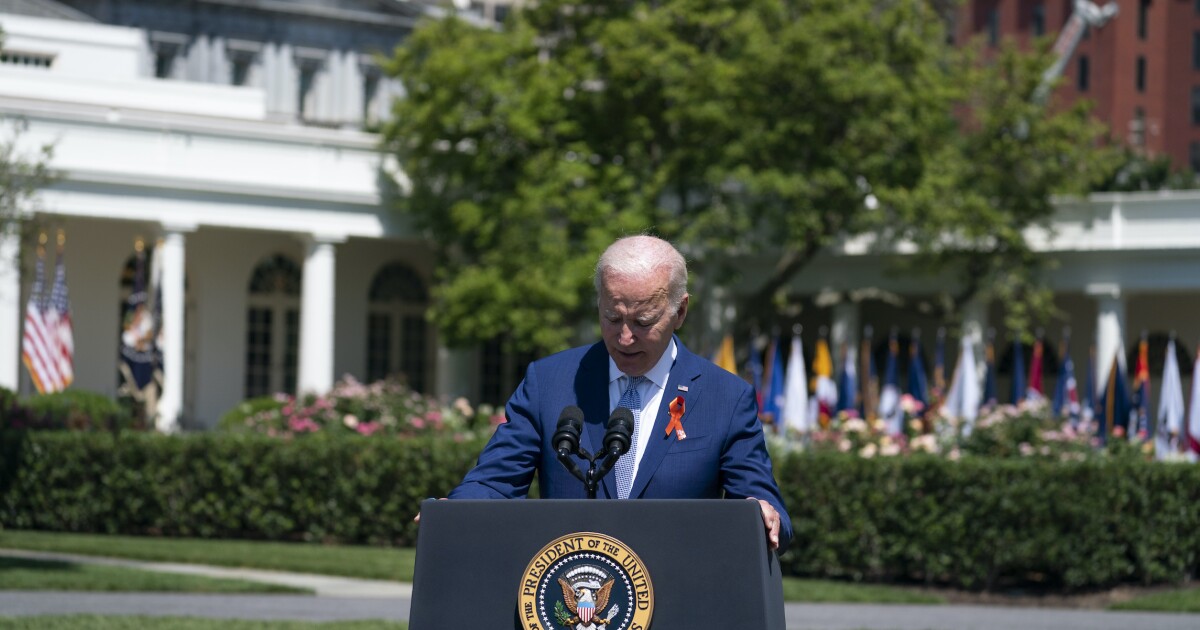

The White House is downplaying a dismal set of poll numbers for President Joe Biden, arguing that those weren’t the numbers that were most important months ahead of the midterm elections.
Several recent polls show Democrats losing confidence in Biden’s leadership while lopsided majorities of Republicans and independents reject him.
“There’s going to be many polls,” White House press secretary Karine Jean-Pierre told reporters at Monday’s briefing. “They’re going to go up and they’re going to go down. This is not the thing that we are solely focused on.”
WHITE HOUSE PROMISES ABORTION SUPPORTERS BIDEN’S ROE FIGHT ISN’T OVER
Jean-Pierre was asked about a New York Times/Siena College poll that found Biden with only a 33% job approval rating. More troubling for the administration, 64% of Democrats said they would prefer a different presidential nominee in 2024. The same survey found a scant 13% of people who believe the country is on the right track.
Biden’s top spokeswoman noted that 92% of Democrats would still support Biden in a rematch against former President Donald Trump. The president held a slender 3-point lead over his predecessor, though he was stuck in the mid-40s.
A new Civiqs poll pegged Biden’s national job approval rating at 30%, with 58% disapproving. It also showed Biden underwater in 48 out of 50 states, including such Democratic bastions as California, New York, and Massachusetts, and above 50% nowhere.
Biden’s numbers figure to be a significant drag on down-ballot Democrats this year, imperiling the party’s already slim majorities in both houses of Congress. His approval rating was 25% in Georgia, with 63% disapproving; 26% in Arizona, with 63% disapproving; 29% in Nevada, with 60% disapproving; 30% approval in Pennsylvania to 57% disapproval; and 34% approval against 52% disapproval.
All of the above states have competitive Senate races this fall. The chamber is already split 50-50 and only under Democratic control because Vice President Kamala Harris holds a tiebreaking vote. Democrats hold a 220-210 edge over Republicans in the House and lost seats in 2020, even when Biden was in a stronger position electorally.
But the latest polls also suggest longer-term peril for Biden’s reelection prospects. Only 26% of Democrats said the party should renominate him, according to the New York Times/Siena survey. Age (33%) and performance in office (32%) ranked as the highest reasons among Democrats who don’t want to run Biden in the next general election.
The president, already the oldest person ever to hold the office, will turn 80 later this year. He would be 82 not long after the next presidential election. The previous record holder, Ronald Reagan, left office less than a month before his 78th birthday.
Bill Clinton and Barack Obama, the past two Democratic presidents, suffered huge midterm losses but rebounded, attracted no serious primary competition, and won second terms in the White House. Biden is already facing significant Democratic defections, though no one is actively campaigning against him yet.
If these numbers continue, that could change. President Lyndon Johnson dropped his reelection bid in 1968 after a stronger-than-expected challenge by Minnesota Sen. Eugene McCarthy in the New Hampshire primary, just four years removed from a landslide in which he won more than 60% of the popular vote.
President Jimmy Carter faced Massachusetts Sen. Ted Kennedy in the 1980 primaries as he dealt with inflation, high energy prices, and embarrassments abroad. Carter held on to his party’s nomination but lost 44 states in the November election against Reagan.
The last incumbent president to face a well-known primary challenger was George H.W. Bush in 1992. Commentator and former White House aide Pat Buchanan drew 37% of the vote against Bush in the New Hampshire primary. Bush went on to lose in November, winning the lowest share of the popular vote for a sitting president since William Howard Taft in 1912.
CLICK HERE TO READ MORE FROM THE WASHINGTON EXAMINER
Biden’s team maintains that as inflation goes down and voters look at the economy, his numbers could improve. The RealClearPolitics polling average found that just 33% approve of Biden’s handling of the economy, while 62% disapprove.
“We’re not going to pay attention to polls,” Jean-Pierre said. “That’s not what we’re going to do here.”






